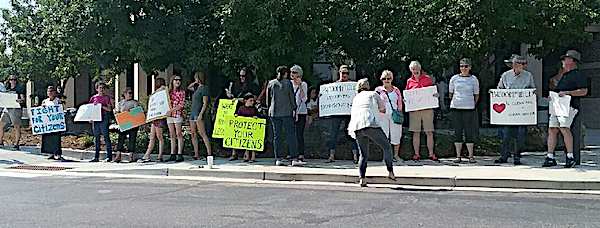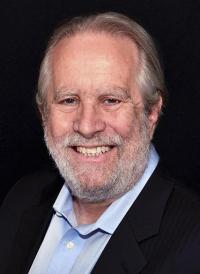Who will resist fracking’s powerful defenders?
Leora Frankel | Feb 2, 2019

The medical evidence is pretty clear. But don’t count on Colorado Democrats – or even Boulder County Commissioners — to just say no to fracking.
At a town hall meeting on January 16 at the Rayback Collective in Boulder, local activist and attorney Alan Rosenfeld questioned State Senator Steve Fenberg and State Representative Edie Hooton (both Democrats) with gusto.
Rosenfeld was present as a member of the audience, but his manner and buildup towards a dramatic conclusion suggested that he finally had the two elected officials on the witness stand.

“How far from your home would you choose to have a fracking pad in order to feel confident that you and your family are safe?” asked Rosenfeld, his hair pulled back in a ponytail, microphone in hand.
Sen. Fenberg, dressed in a suit and tie, replied, uncomfortably: “That’s a silly question, in my opinion. Many, many miles. I would not want to live anywhere near oil and gas extraction.”
Rosenfeld did not wait for the senate majority leader to complete his sentence before pronouncing loudly: “So why are you talking about regulating? We want it shut down! It’s time to acknowledge that it’s a dangerous industry that is poisoning us. Your job is to stop them.”
Here was the divide between how the Colorado Democratic leadership, on the one hand, and a growing anti-fracking movement, on the other hand, define the job of the newly elected Democratic legislators. With a sweep of the Colorado house, senate and governorship in the 2018 elections, the Democrats appear to be perfectly positioned to fulfill their voters’ wish list. Yet just a short while earlier, during the town hall meeting, Feinberg had said: “Our job is to basically get as much done as the political reality allows us, and I think we’re going to be able to make incredibly significant and meaningful reform this year.”
What can we expect from lawmakers?
The message coming from the top to the base is: lower your expectations. Or, better yet, lower your demands.
The question now is, what can people along the Front Range, who are living alongside one of the densest concentrations of oil and gas wells in the United States, expect from their elected representatives by the end of this legislative session, in early May? What bills are likely to pass? What other changes may be executed?
On the opening day of the legislature, January 4, Colorado Rising, the environmentalist organization that had initiated last November’s failed Proposition 112, which would have sharply increased drilling setbacks, demanded the enactment of a moratorium on all new drilling permits. The organization directly lobbied newly elected Governor Jared Polis as well.
“Our main ask is for a moratorium on all new oil and gas drilling, so as to give time to the Colorado Department of Public Health and Environment to assess the existing health studies and data and to advise the legislature on new laws,” Anne Lee Foster, Director of Communications and Community Engagement at Colorado Rising, told me recently. At Colorado Rising, the view is that the 1.1 million voters who supported Proposition 112 should be perceived by those in elected office as a power to be reckoned with. Those votes had been hard won, in the face of a $40-million campaign blitz bankrolled by the oil and gas industry (Colorado Rising, strapped for large donations, spent $1 million).
Yet the unsettling defeat of Proposition 112, a safety regulation designed to appeal to common sense and the near-universal desire of people to protect their own health and safety (and that of their loved ones), confirmed to politicians that the oil and gas industry remains firmly entrenched.
Power of lobbyists
In a phone interview, State Rep. Jonathan Singer (D.), who is considered a reliable player in the struggle to contain fracking, invoked the recent spending by the industry as a cautionary tale. Rep. Singer said he would not be surprised if the same scale of spending were unleashed to defeat any future bills restricting oil and gas activity.

It is abundantly clear that among elected officials there is no appetite for a moratorium.
A moratorium would have addressed head-on the urgency of the threat facing communities, according to Colorado Rising’s Foster: “We’ve been fighting this battle for over seven years.”
Foster added that more than 6,200 permits, mostly in urban areas, are currently awaiting approval by the Colorado Oil and Gas Conservation Commission, a number that’s almost triple the number that were pending before the COGCC in January of 2018. “We need the moratorium,” she added, “before irreparable harm is done next to schools and neighborhoods.”
Heatherwood neighborhood targeted
At a recent event, I met an activist from Gunbarrel. She had several weeks earlier found an unwelcome letter in her mailbox sent on behalf of Extraction Oil & Gas, an early and obligatory step in the company’s plans to drill nearby. Her neighbors had received letters too. Neighborhood residents then organized a team to oppose the drilling, naming themselves Frack-Free Heatherwood.
This is now a common occurrence along the Front Range: neighborhoods taking on enormously powerful corporations that inevitably win, thanks to state laws designed to protect the oil and gas industry. Under current law, drilling can occur as close as 500 feet from residences.
Jean Lim, co-chair of Broomfield Concerned and co-chair of the Wildgrass Oil and Gas Committee, has been fighting just such a battle against the installation of mega-well pads by Extraction Oil & Gas in her community for two years now. The Livingston pad, which would be the one closest to her, is to be erected within two miles of 7,000 people, according to Lim. “After hundreds and hundreds and hundreds of hours, at the COGCC, state and local levels, challenging it hasn’t yielded any results,” she said in a phone interview.
In January, the residents sued the State of Colorado, including the COGCC and Governor Polis, arguing that the practice of forced pooling violates the Colorado Constitution. “We’re stretching ourselves and our resources to file the lawsuit,” Lim said, sounding determined but still in disbelief over the roles she has had to assume.
Forced pooling is a practice that obligates owners to lease their mineral rights to, in this case, oil and gas companies. In doing so, the rights become part of a “pool.” Lim and her associates are arguing that forced pooling violates their property rights.
Court defends the frackers
When, over the years, ordinary individuals went before the COGCC to contest drilling near their homes, they often were under the impression that the Commission is required to factor health and safety into their deliberations. But on January 14, in a decision of major importance, the Colorado Supreme Court ruled in the case of COGCC v Martinez in favor of the former, viewing the Commission as essentially a state-run protector of the oil and gas industry.
Specifically, the court decided: “the provisions make clear that the Commission is required (1) to foster the development of oil and gas resources, protecting and enforcing the rights of owners and producers, and (2) in doing so, to prevent and mitigate significant adverse environmental impacts to the extent necessary to protect public health, safety, and welfare, but only after taking into consideration cost-effectiveness and technical feasibility [italics added].”
The court held that COGCC decisions should not follow a balancing test between oil and gas development and the protection of public health and the environment.
The court’s clear-enough viewpoint is that the COGCC’s primary mission is to create the conditions for a thriving extraction industry.
This is by now old news. However, the decision has added urgency to the calls to rewrite sections of the Oil and Gas Conservation Act, which is the basis for the COGCC’s powers.
In that regard, readers may be pleased to learn that the introduction and passage of a bill that would task the Commission with regulating the oil and gas industry in a way that protects public health and safety is likely to be included in a comprehensive reform package that both Sen. Fenberg and his counterpart, Rep. KC Becker, a Boulder Democrat and House majority leader, are touting. Rep. Singer said he is consulting with attorneys and colleagues before deciding whether to introduce a bill based on HB1071, a bill introduced in 2018 by then-Rep. Joe Salazar (who has since become executive director of Colorado Rising), which was adopted by the House but failed in the Senate. The bill could for the first time give weight in the permitting process to health concerns ranging from leukemia associated with airborne hydrocarbons to water contamination caused by the high-powered injection of fracking fluids.
“Death by a thousand cuts”
At the Jan. 16 Boulder town hall meeting, Rep. Hooton made an interesting remark, hesitantly prefacing it: “I don’t know if I should say this, but I’m going to. It might have to be death by a thousand cuts, but we’re just starting this year.” In other words, fracking in Colorado will not die a sudden death. It will be weakened gradually through many incisions. At least that appears to be the strategy of the state Democratic leadership.
Perhaps the most significant bill under discussion is one that would bestow authority on local governments to regulate oil and gas activity in their domains.
Under then-Governor John Hickenlooper, the State of Colorado sued municipalities that passed fracking bans. In a 2016 decision in City of Longmont v Colorado Oil and Gas Association, the Colorado Supreme Court ruled that state law preempted municipal law in the matter of the city’s fracking ban, rendering the ban “invalid and unenforceable.” To give communities a say, lawmakers would now need to surrender this state supremacy in regulating the oil and gas industry, carving out room for local authorities to impose their own regulations.
How far could such a law go? It’s unclear whether it would merely give cities and counties permission to create larger setbacks — perhaps up to a certain maximum number of feet — or would go as far as legalizing outright bans on fracking.
Depending on the wording of the bill and on one’s place of residence, such a law could be fairly impactful, or not at all. For people who are facing the prospect of mega-well pads across from their backyards, it could provide relief. But it could also create greater disparities among residents, while skirting fundamental health issues. For Rosenfeld, the activist, such a law could end up being mostly a feel-good measure to calm the populace.
Other initiatives by lawmakers may include increased mandatory monitoring of the air, water and soil and commissioned health studies; a law curtailing forced pooling; an increased tax on oil and gas profits (though it seems TABOR could interfere with this one); and a separate charge known as a severance tax to address the exorbitant cost of capping orphaned wells, which is currently shouldered by Colorado taxpayers. There are at present about 60,000 active wells and tens of thousands more that are inactive but not necessarily orphaned.
Polis straddles fence
Oftentimes change emanates from the executive branch. Governor Polis, in his inaugural address, announced: “Just as we stand up for workers and good jobs, so too must we stand up for our communities and their right to have a voice when it comes to industrial activities within their borders. It’s time for us to take meaningful action to address the conflicts between oil-and-gas drilling operations and the neighborhoods they impact, and to make sure that all of our communities have clean air and water.” These words, too, suggest reform. The jobs provided by oil and gas companies are placed on one side of the scale, while the environmental and health concerns of Colorado citizens lie on the other side of the scale. As during his campaign, Gov. Polis is trying to straddle the fence, while the debate rages on.
Gov. Polis’s newly appointed Acting Director of the COGCC, Jeff Robbins, is an attorney with experience representing local communities before the Commission. Lim, of Broomfield Concerned, who saw Robbins in action working on behalf of Adams County residents, is maintaining a hopeful attitude. “I think his background would bring a fresh perspective to the COGCC,” she told me. As an example of the power wielded by Robbins, you need look no further than Sen. Fenberg’s situation. Shepherding a comprehensive reform package through the Senate will take time – and yet the drilling permit applications are piled high, a veritable teetering tower.
Sen. Fenberg wrote in an email that he’s counting on Robbins to be “more judicious in approving permits until we pass the bill setting the new regulations for the industry, etc. In other words: the executive branch can temporarily slow down / pause the administrative activity at the COGCC while the legislative branch will change the laws for the long term.” A creative solution, I would add.
Dems as industry cheerleaders
What’s the political reality that elected Democratic officials are referring to? In the most straightforward sense, it is the Democrats’ mere three-vote majority in the Senate. The party can afford to lose only one vote to the other side, with seats at 19 Democrats to 16 Republicans.
Not all Democratic senators can be relied upon even to vote yes for regulatory measures. Colorado Rising this past week notified its members of a town hall meeting featuring State Senators Angela Williams (D.) and Lois Court (D.), both cheerleaders, in tweets, of the oil and gas industry. Stapleton and Aurora, in these two senators’ districts, are among communities being pulled into the fracking tumult.
From what I’ve gathered, the attitude of the Democratic leadership is that, if the constituents of politicians such as Senators Williams and Court fail to apply pressure on them to oppose the oil and gas industry, then the noise coming out of places like Boulder, with its dedicated anti-frackers, won’t much matter.
The sad non-political reality of it is that the health studies showing the adverse effects of fracking keep accumulating (see, for example, this compendium of findings on fracking’s hazards published last May by Physicians for Social Responsibility).
It remains to be seen whether Jill Hunsaker Ryan, who has been nominated to be the new Executive Director of the Colorado Department of Public Health and Environment, responds to Colorado Rising’s plea to review the literature. She could play an important role in protecting the citizens of Colorado. But, then again, she is a political appointee of Polis, who in his gubernatorial campaign opposed Proposition 112.
New York State said no
Back in December 2014, New York state managed to ban all fracking. That decision was driven by testimony by Dr. Howard A. Zucker, then the state’s acting health commissioner, who ticked off fracking’s “significant public health risks.” According to The New York Times, “Dr. Zucker said his review boiled down to a simple question: Would he want his family to live in a community where fracking was taking place?”
His answer was no.
“We cannot afford to make a mistake,” he was quoted as saying. “The potential risks are too great. In fact, they are not even fully known.”
Closer to home, in January, the Boulder County Democratic Executive Committee voted against a policy proposition, proposing a fracking ban as one of its goals, that was brought forward by Rosenfeld, who sits on the Committee. It concluded with: “Therefore be it resolved that the Boulder County Democratic Party calls on our elected State Senators as well as Representatives in the legislature to work in the upcoming legislative session for the passage of legislation that will ban fracking in Colorado.”
All three County Commissioners — Elise Jones, Deb Gardner and Matt Jones — opposed it.


Thank you for the well written article. The ending sentence suggests there will be a sequel? I would be interested in learning why the three commissioners voted against the policy ban.
Editor, this article is totally worthless in so far as to describe the absence of any Democratic lawmakers opposition to fracking and oil development near people’s homes, schools hospitals and the serious adverse health effects to those people; or for that matter to the adverse health effects to the Earth’s environment. Politicians are to blame for the ongoing use of fossil fuels and the lack of any serious efforts to curtail their use, period. Our local, state and federal government have proven themselves to be useless in our number one threat to our survival.
THE reality is that Colorado is owned by oil and gas. They will do whatever they need to do to keep that ownership. One of the best ways to get to these guys is to hit them in the pocket book. A dent has been made with renewable energy and hybrid cars. How many of us are willing to do this? We all need to push public transit! How many of us are willing to do this? How many of us are willing to leave our cars at home even one day per week? My husband and I are doing a little of our part! We have solar on our home and a hybrid car. It is difficult to leave my car in the garage one day per week! We cannot rely on our elected officials to take care of us! yes, we need to keep fighting for legislation AND we need to do our part!